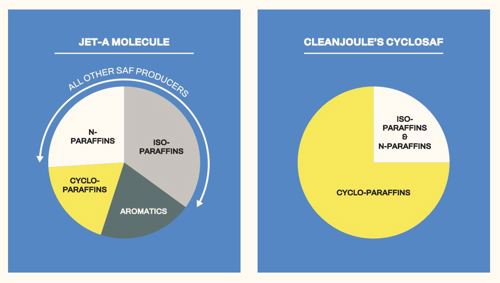CleanJoule’s CycloSAF enters ASTM International’s certification program
CleanJoule, the full performance sustainable aviation fuel (SAF) company, has announced that its CycloSAF product has formally started ASTM International’s D4054 process for qualification to be blended with conventional Jet A/A-1.
The ASTM International process ensures CleanJoule’s CycloSAF meets the organization’s identified set of properties to ensure compatibility with airframes and engines when blended with conventional jet fuel. CleanJoule’s CycloSAF synthetic blending component is 10% more energy dense than typical Jet A/A-1 while tapping abundant waste biomass as the feedstock.

“Over the last several years the CleanJoule team has worked to hone our proprietary SAF pathway to deliver on our mission of eliminating the aerospace industry’s reliance on fossil fuels. Our CycloSAF product has undergone countless tests and has been supported by both the Department of Defense and the Department of Energy as they seek out innovations that enable decarbonization of aviation while also protecting our nation from price volatility, foreign dependence, and supply chain risk,” said Mukund Karanjikar, CEO and Founder, CleanJoule. “We are positioned to have our industrial demonstration plant ready to commence production as we receive approval to sell CycloSAF industry wide.”
Today, only eight SAF production process pathways have been qualified by ASTM International as compliant with ASTM D7566-22, the standard specification for aviation turbine fuel containing synthesized hydrocarbons. With aviation fuel demand expected to rise to 160 billion gallons per year (Bgpy) by 2050, innovative SAF pathways such as CleanJoule’s are needed to produce abundant SAF.
Additionally, for corporations seeking to invest in value chain decarbonization—or Scope 3 credits—CleanJoule represents a near-term path to meeting emissions reduction targets as SAF could potentially contribute 65% of the reduction in emissions needed by the aviation sector to reach net-zero in 2050.






Comments